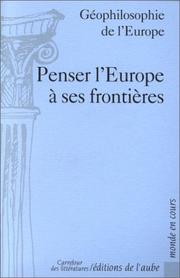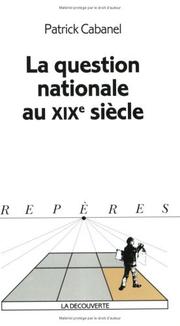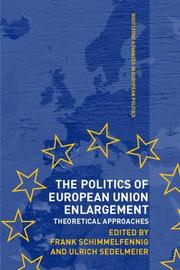| Listing 1 - 10 of 41 | << page >> |
Sort by
|

ISBN: 2876781506 9782876781504 Year: 1993 Publisher: La Tour d'Aigues : Editions de l'Aube,
Abstract | Keywords | Export | Availability | Bookmark
 Loading...
Loading...Choose an application
- Reference Manager
- EndNote
- RefWorks (Direct export to RefWorks)
Book
ISBN: 2752601271 9782752601278 Year: 2005 Volume: *3 Publisher: Paris L'Aube
Abstract | Keywords | Export | Availability | Bookmark
 Loading...
Loading...Choose an application
- Reference Manager
- EndNote
- RefWorks (Direct export to RefWorks)
Book
ISBN: 9781138589582 Year: 2018 Publisher: London Taylor & Francis
Abstract | Keywords | Export | Availability | Bookmark
 Loading...
Loading...Choose an application
- Reference Manager
- EndNote
- RefWorks (Direct export to RefWorks)
This paper discusses the cohesion of Europe's geopolitical architecture, and offers a new way of understanding the contemporary regional balance. The author contends that Europe is undergoing a balance of power crisis set in motion by three structural developments : US retrenchment in Europe; Germany's emerging leadership position within the EU; and Russia's push to recreate a sphere of influence in Eastern Europe. It analyses what these changes mean for Europe's geopolitics, and the role that the UK and France can play in stabilising the regional order. Although post-war Europe appears to have overcome its historical security dilemma, this paper argues that the principle of the balance of power remains at the heart of the region's geopolitical order. As global attention shifts to other regions, the author argues that the UK and its continental allies must not underestimate the need to maintain European stability.
Book
ISBN: 0340580186 9780340580189 Year: 1998 Publisher: New York London Auckland Arnold
Abstract | Keywords | Export | Availability | Bookmark
 Loading...
Loading...Choose an application
- Reference Manager
- EndNote
- RefWorks (Direct export to RefWorks)
Geopolitics --- Europe --- Historical geography --- Geopolitics - Europe --- Europe - Historical geography

ISBN: 2707126861 9782707126863 Year: 1997 Volume: 214 Publisher: Paris : La Découverte,
Abstract | Keywords | Export | Availability | Bookmark
 Loading...
Loading...Choose an application
- Reference Manager
- EndNote
- RefWorks (Direct export to RefWorks)
Nationalism --- Nationalisme --- History --- Histoire --- National state --- Geopolitics --- Nationalism - Europe --- Geopolitics - Europe - History
Book
ISSN: 12720151 ISBN: 2746707802 9782746707801 Year: 2005 Publisher: Paris : Editions Autrement,
Abstract | Keywords | Export | Availability | Bookmark
 Loading...
Loading...Choose an application
- Reference Manager
- EndNote
- RefWorks (Direct export to RefWorks)
Geopolitics --- Geopolitical atlas - Europe --- Europe --- Geopolitics - Europe - Maps --- Geopolitics - Turkey - Maps --- Atlas mondiaux

ISBN: 1134234260 1280247738 9786610247738 0203008723 9780203008720 041536129X 9780415361293 9781134234264 9781134234219 113423421X 9781134234257 1134234252 9780415498944 0415498945 Year: 2007 Volume: 30 Publisher: London Routledge
Abstract | Keywords | Export | Availability | Bookmark
 Loading...
Loading...Choose an application
- Reference Manager
- EndNote
- RefWorks (Direct export to RefWorks)
This is a key reference text presenting the latest first-rate approaches to the study of European enlargement.Developed and significantly expanded from a special issue of the leading Journal of European Public Policy, this new volume draws on the insights from the recently emerging theoretically-informed literature on the EU's eastern enlargement and complements these studies with original articles that combine a theoretical approach with comparative analyses. These expert contributors focus on the broader theoretical debates and their implications for the enlargement
Geopolitics --- European Union --- E.U. --- Membership. --- Géopolitique --- International relations. Foreign policy --- Geopolitics - Europe
Book
ISBN: 9781107027343 9781139225809 9781107676503 9781139779944 113977994X 1139225804 9781139776905 1139776908 9781139782937 1139782932 9781283746502 1283746506 1107676509 1107027349 1139794302 1139889419 1139783823 1139778420 9781139794305 9781139889414 9781139783828 9781139778428 Year: 2013 Volume: 124 Publisher: Cambridge Cambridge University Press
Abstract | Keywords | Export | Availability | Bookmark
 Loading...
Loading...Choose an application
- Reference Manager
- EndNote
- RefWorks (Direct export to RefWorks)
The end of the Cold War demonstrated the historical possibility of peaceful change and seemingly showed the superiority of non-realist approaches in International Relations. Yet in the post-Cold War period many European countries have experienced a resurgence of a distinctively realist tradition: geopolitics. Geopolitics is an approach which emphasizes the relationship between politics and power on the one hand; and territory, location and environment on the other. This comparative study shows how the revival of geopolitics came not despite, but because of, the end of the Cold War. Disoriented in their self-understandings and conception of external roles by the events of 1989, many European foreign policy actors used the determinism of geopolitical thought to find their place in world politics quickly. The book develops a constructivist methodology to study causal mechanisms and its comparative approach allows for a broad assessment of some of the fundamental dynamics of European security.
Geopolitics --- History --- Europe --- Foreign relations --- Political science --- International Relations --- General. --- World politics --- Social Sciences --- Political Science --- Geopolitics - Europe - History - 20th century --- Geopolitics - Europe - History - 21st century --- Europe - Foreign relations - 1989 --- -Geopolitics
Book
ISSN: 07367163 ISBN: 9780892065455 0892065451 Year: 2008 Volume: 30/6 Publisher: Washington : CSIS Press,
Abstract | Keywords | Export | Availability | Bookmark
 Loading...
Loading...Choose an application
- Reference Manager
- EndNote
- RefWorks (Direct export to RefWorks)
Geopolitics --- Géopolitique --- Russia (Federation) --- Russie --- Foreign relations. --- Relations extérieures --- Foreign relations --- Géopolitique --- Relations extérieures --- Geopolitics - Europe --- Geopolitics - Eurasia --- Russia (Federation) - Foreign relations
Book
ISBN: 9782707188502 2707188506 Year: 2015 Volume: 214 Publisher: Paris : La Découverte,
Abstract | Keywords | Export | Availability | Bookmark
 Loading...
Loading...Choose an application
- Reference Manager
- EndNote
- RefWorks (Direct export to RefWorks)
La question nationale est la principale clé de lecture de l'histoire géopolitique européenne au XIX e siècle. Proclamée par la Révolution française, l'idée de nation conduit à une confrontation avec les penseurs allemands (Fichte après Herder), qui culmine au sujet de l'appartenance de l'Alsace en 1870. Elle bouleverse la face du continent, simplifiant les cartes (Italie, Allemagne) ou les surchargeant (décombres des empires multinationaux). Longtemps progressiste avec le principe des nationalités, l'idée de nation montre par la suite un visage plus agressif. Tantôt elle sape les fondements de l'État (dans l'Autriche des Habsbourg), tantôt elle le seconde dans sa construction d'une nouvelle citoyenneté. Mais, face à certaines minorités et diasporas, elle est porteuse de sombres promesses, plus tard mises à exécution par la jeune Turquie puis l'Allemagne nazie. Ce livre, entièrement révisé pour cette nouvelle édition, montre que la nation tire sa force de son imbrication avec d'autres éléments de l'identité : l'histoire, la langue, la religion, voire les inégalités de développement. -- Quatrième de couverture
Nationalism --- National state --- Geopolitics --- History --- Europe --- Politics and government --- Nation-state. --- Nationalisme --- Nation --- History. --- Nationalism - Europe --- Geopolitics - Europe - History --- Europe - Politics and government - 19th century
| Listing 1 - 10 of 41 | << page >> |
Sort by
|

 Search
Search Feedback
Feedback About UniCat
About UniCat  Help
Help News
News